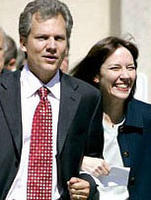Judith Miller and the Dangerous Business of Becoming a Player
 Even now that I. Lewis (Scooter) Libby has been identified as Judith Miller's source in the investigation into the outing of CIA operative Valerie Plame, the whole affair seems murkier than ever. Miller, in an interview this morning with Barbara Walters on ABC, said that the waiver from Libby was inadequate because, as a blanket waiver requested by his employer, it was "inherently coercive."
Even now that I. Lewis (Scooter) Libby has been identified as Judith Miller's source in the investigation into the outing of CIA operative Valerie Plame, the whole affair seems murkier than ever. Miller, in an interview this morning with Barbara Walters on ABC, said that the waiver from Libby was inadequate because, as a blanket waiver requested by his employer, it was "inherently coercive."Adding to the air of mystery is the friendly tone of Libby's letter to Miller:
"Your reporting, and you, are missed," began Vice President Cheney's chief of staff in his Sept. 15 letter releasing Miller from any pledge of confidentiality and urging her to testify in the Valerie Plame leak investigation. "You will have stories to cover -- Iraqi elections and suicide bombers, biological threats and the Iranian nuclear program. Out West, where you vacation, the aspens will already be turning. They turn in clusters, because their roots connect them. Come back to work -- and life."It's hard to imagine that Libby required confidentiality to protect him from repercussions if his employer found out he was on such friendly terms with a New York Times reporter who was writing stories helpful to the administration. By offering confidentiality to Libby and others, Miller gave the dubious evidence of WMDs an air of objectivity that served the administration's purpose of leading us into war.
Confidentiality is not a sovereign right, but instead needs to be balanced with other compelling interests. David Ignatius in the Washington Post points out that reporters are not free agents in granting confidentiality:
The big lesson of the Miller affair, for me, is that editors are crucial in mediating the relationships between reporters and sources. Almost by definition, those relationships become incestuous -- with journalists and their sources chasing the same facts and often seeking to right the same wrongs. It's the job of editors to intervene in this process -- and demand to know, on behalf of readers, whether a story is really true. In Miller's case, she filed stories about Iraqi weapons of mass destruction based on what her sources had told her, but the crucial judgment lay in the hands of her editors.Even with the proliferation of electronic media, the Times is a uniquely powerful institution. Its reporters, editors and columnists have from time to time succumbed to the pull of powerful people and become "players" as described by Russell Baker in his memoir The Good Times:
This process of editorial intervention is even more important when it comes to making promises to sources about confidentiality. Reporters shouldn't be able to decide unilaterally to whom they will attach their newspaper's reputation.
I felt no temptation to become a player, to be in with the winning crowd at the White House, have gaudy names to drop, play touch on the lawn at Hyannisport. I was temperamentally disinclined to such pleasures. More and more, my interest in politicians was confined to the study of the species...Times publisher Arthur O. Sulzberger, Jr. and the paper's editors allowed Judith Miller to become a player. The history of the Times offers another instructive footnote to the Miller case. After the Bay of Pigs fiasco, President Kennedy quietly told the aforementioned Turner Catledge, "Maybe if you had printed more about the operation, you would have saved us from a colossal mistake." (Quoted in The Trust, Susan E. Tifft and Alex S. Jones, p. 315)
What's more, I had just had a sobering talk with [managing editor] Turner Catledge in New York. From this I learned that becoming a player had harmed Bill Lawrence worse than most people suspected. Turner had called me in to tell me that I was to cover all of the forthcoming network television debates between Kennedy and Nixon.
...
Arriving on the Kennedy campaign, I was on notice that becoming a player was now dangerous business. (p. 325)



0 Comments:
Post a Comment
<< Home